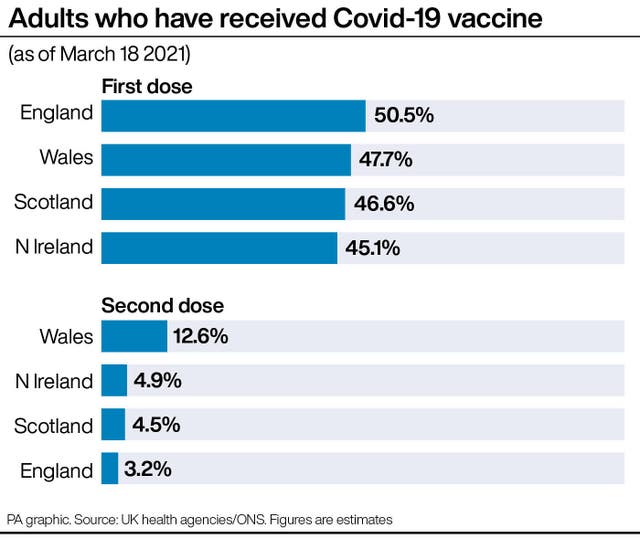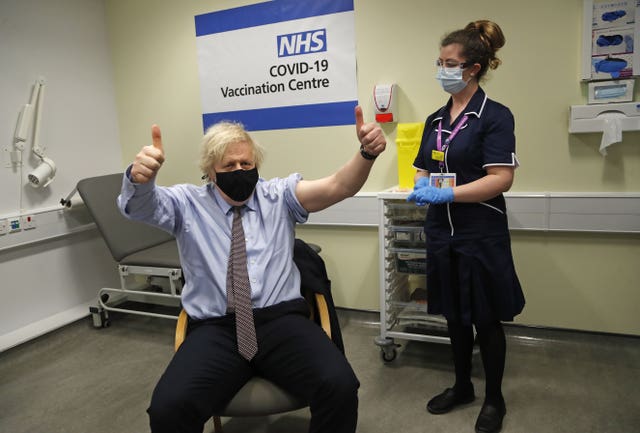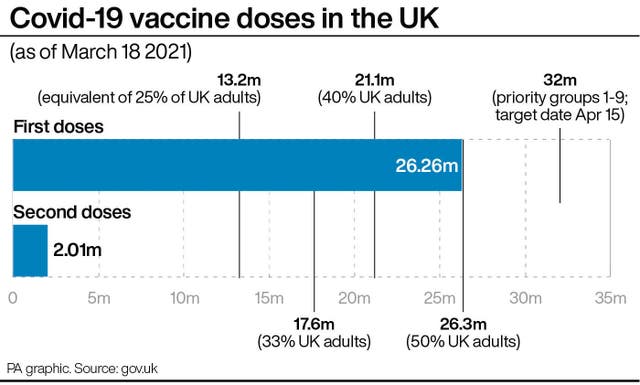UK on verge of passing 50% of adults given first dose of Covid vaccine
Prime Minister Boris Johnson received his first dose of the Oxford/AstraZeneca coronavirus vaccine on Friday evening.

The UK is on the verge of reaching the major milestone of giving more than 50% of the adult population their first dose of coronavirus vaccine.
Government data up to March 18 suggests that 49.9% of the population aged 18 and over have received a first dose, with an estimated 73,000 more jabs needed to pass the halfway mark.
It comes after Prime Minister Boris Johnson received his first dose of the Oxford/AstraZeneca vaccine on Friday evening.
Meanwhile, a rise in coronavirus infections has led to countries across Europe imposing tougher restrictions, with UK scientists concerned about outbreaks of the South African variant.

Government sources said the UK needs to be wary of what is happening in Europe “because in the past that has led to a rise here a few weeks later”, although how things will pan out is uncertain.
European countries are seeing pockets of the South African variant, with studies suggesting vaccines work less well against this variant.
In the UK, hospital admissions and deaths are still coming down due to the effect of vaccines, but there are worries that cases could rise quickly once restrictions are eased.
Experts believe there will be an increasing “disconnect” between cases and hospital admissions and deaths going forward, as vaccines work to keep people from dying.
Regarding foreign holidays this summer, Government scientists say it is still unclear what will happen, but the risk of importing cases and variants comes from countries with a higher prevalence than the UK.
On Friday, Mr Johnson gave a double thumbs-up to mark his vaccination as he was given the jab at Westminster Bridge Vaccination Centre at St Thomas’ Hospital in central London shortly after 6.30pm.
Leaving hospital he told reporters: “I literally did not feel a thing and so it was very good, very quick and I cannot recommend it too highly.
“Everybody, when you get your notification to go for a jab please go and get it. It is the best thing for you, best thing for your family and for everybody else.”
The Prime Minister had previously dismissed concerns it was linked to blood clots, and told the nation it was “safe” at a press briefing on Thursday.
Mr Johnson was treated in the intensive care unit at St Thomas’ Hospital in April last year after his coronavirus symptoms worsened.
His jab comes as England became the first of the four UK nations to pass the milestone of giving a first dose of vaccine to more than 50% of the adult population.
A total of 22,337,590 people had been given a first jab as of March 18, according to NHS England.
This is the equivalent of 50.5% of the population of England aged 18 and over, based on the latest estimates by the Office for National Statistics (ONS).
A separate milestone has been passed in Wales, where one in 10 of the total population is likely to have had both doses of the vaccine.

In Europe, the French government announced that new lockdown restrictions would be imposed on Paris from midnight on Friday due to an increase in cases.
Prime Minister Jean Castex said France was facing a “third wave” of the pandemic, adding the new measures will last for four weeks.
Chancellor Angela Merkel said Germany may need to apply an “emergency break” on relaxing restrictions amid a rise in infections.
Poland begins a new three-week lockdown on Saturday, with shops, hotels, cultural and sporting facilities closed, while other countries including Italy and Spain have opted for curfews in a bid to reduce the rate of transmission.
Earlier, Professor Neil Ferguson, from Imperial College London, said the UK must keep the South African Covid-19 variant at bay as some European countries reported a third wave of infections.
Prof Ferguson, who spurred the UK’s decision to go into lockdown last March, warned that a group of European countries are seeing increasing levels of coronavirus cases.
“Perhaps more concern for the UK though is that some countries are notably seeing a significant fraction, 5-10% of cases, of the South African variant,” he told BBC Radio 4’s Today programme.
“That is the variant we really do want to keep out of the UK.”
A study published on Thursday by Oxford University suggested that the Pfizer and AstraZeneca jabs could struggle against the South African variant and may end up offering limited protection.
Researchers said the South African variant should be the focus of any efforts to create new vaccines that may be needed next winter.
Prof Ferguson said there are “important decisions coming up” with regards to dealing with variants, including how much the ban on international travel is relaxed.
One way of dealing with variants may be through “introducing testing of people coming into the country”, he suggested, but added: “These are policy decisions.”

Countries including France, Germany and Italy have also began restarting their vaccine programmes with the AstraZeneca jab – reversing earlier decisions to suspend them over blood clot concerns.
The rollout of the AstraZeneca coronavirus vaccine will resume in Ireland on Saturday, the Health Service Executive has announced.
HSE chief clinical officer Dr Colm Henry said: “We welcome the review by the European Medicines Agency and the positive outcome.
“We will now put in place the updated information and advice recommended by NIAC, and begin rescheduling vaccinations starting with a relatively modest number tomorrow (Saturday).”
The European Medicines Agency (EMA) said the AstraZeneca vaccine was “safe and effective” and its benefits in preventing Covid-19 hospital admission and death greatly outweighed potential risks.
The World Health Organisation (WHO) and the UK’s Medicines and Healthcare products Regulatory Agency (MHRA) have said that the jab is safe and have encouraged people to take up their vaccine appointments.
In Wales, First Minister Mark Drakeford has urged people to watch a potential Wales rugby Six Nations Grand Slam at home within their household.
He added: “The last thing we want is to mark a potential Grand Slam weekend with a surge in Covid cases.”





